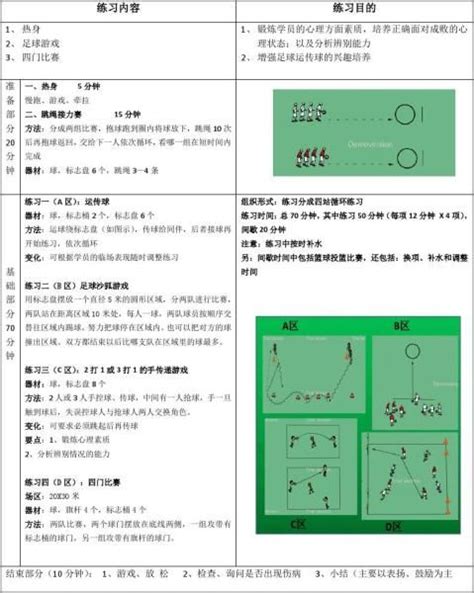足球培训目标
Title: Developing a Comprehensive Football Training Program
Introduction
Football training programs are crucial for nurturing talent, enhancing skills, and fostering teamwork among players. Whether it's for a youth team or professional athletes, a welldesigned training plan is essential for success on the field. In this proposal, we'll outline a comprehensive football training program that covers various aspects, including physical conditioning, technical skills, tactical understanding, and mental preparation.
1. Needs Assessment
Before creating a training program, it's vital to assess the needs of the team or players. This involves evaluating their current skill levels, strengths, weaknesses, fitness levels, and areas for improvement. Conducting interviews, skill assessments, and physical tests can provide valuable insights into the team's requirements.
2. Goal Setting
Based on the needs assessment, set specific, measurable, achievable, relevant, and timebound (SMART) goals for the team or players. These goals should align with the overall objectives of the team and cater to individual development needs. Goals could include improving passing accuracy, increasing stamina, mastering specific techniques, or enhancing teamwork.
3. Training Components

a.
Physical Conditioning:
Develop a structured fitness regimen focusing on endurance, strength, speed, agility, and flexibility.
Incorporate exercises such as interval training, strength training, plyometrics, and flexibility drills.
Tailor workouts to match the demands of football, emphasizing movements like sprinting, jumping, and change of direction.
b.
Technical Skills:
Design drills to enhance ball control, dribbling, passing, shooting, tackling, and heading.
Emphasize repetition and precision to master fundamental techniques.
Progress from basic skills to more complex maneuvers as players advance.
c.
Tactical Understanding:
Teach players about different formations, strategies, and positional responsibilities.
Conduct tactical drills and smallsided games to simulate real match situations.
Encourage players to analyze opponents and adapt their tactics accordingly during games.
d.
Mental Preparation:
Implement psychological training techniques to improve focus, confidence, resilience, and decisionmaking under pressure.
Use visualization, goalsetting, positive reinforcement, and relaxation techniques to enhance mental toughness.
Foster a supportive team environment where players feel motivated and empowered to succeed.
4. Training Schedule
Develop a weekly training schedule that balances various components of the program. Allocate specific time slots for physical conditioning, technical drills, tactical sessions, and match simulations. Ensure adequate rest periods to prevent injuries and promote recovery. Flexibility should be built into the schedule to accommodate adjustments based on individual or team needs.
5. Coaching Staff
Assign qualified coaches who possess expertise in different aspects of football, including fitness training, skill development, tactical analysis, and sports psychology. Coaches should be capable of providing personalized feedback, guidance, and support to players throughout the training program. Continuous professional development opportunities should be provided to ensure coaches stay updated with the latest trends and methodologies in football training.
6. Monitoring and Evaluation
Implement a system for monitoring player progress and evaluating the effectiveness of the training program. Use performance metrics, such as fitness tests, skill assessments, match statistics, and feedback from players and coaches, to track improvements over time. Regularly review the training plan and make adjustments as necessary to address any deficiencies or capitalize on strengths.
7. Conclusion
A welldesigned football training program is essential for maximizing the potential of players and achieving success on the field. By focusing on physical conditioning, technical skills, tactical understanding, and mental preparation, teams can develop a competitive edge and reach their goals. Continuous evaluation and adaptation are key to ensuring the effectiveness of the program in the long term. With dedication, hard work, and proper guidance, players can realize their full potential and excel in the beautiful game of football.
References:
Include relevant sources and literature consulted during the development of the training program.
Provide links or citations for further reading on football coaching, training methodologies, and sports science.
[End of Document]
This HTML document provides a comprehensive outline for developing a football training program, covering various aspects from needs assessment to monitoring and evaluation. It can serve as a guide for coaches and organizations looking to enhance their training protocols and maximize the potential of their players.









